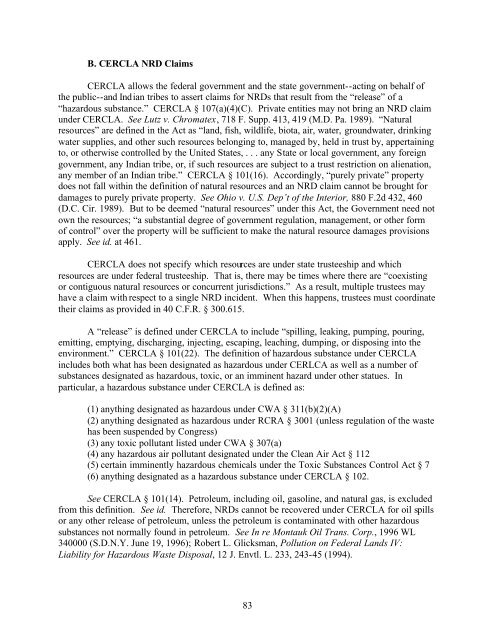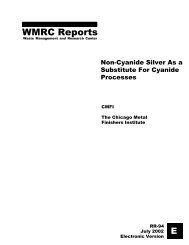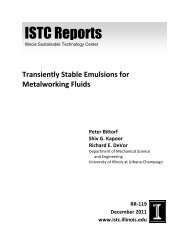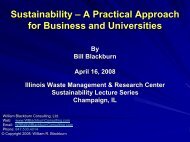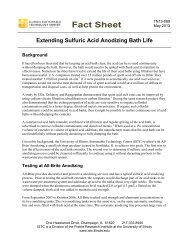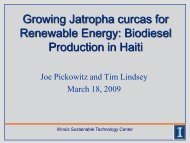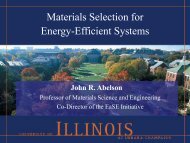Natural Resource Damage Assessment: Methods and Cases
Natural Resource Damage Assessment: Methods and Cases
Natural Resource Damage Assessment: Methods and Cases
Create successful ePaper yourself
Turn your PDF publications into a flip-book with our unique Google optimized e-Paper software.
B. CERCLA NRD Claims<br />
CERCLA allows the federal government <strong>and</strong> the state government--acting on behalf of<br />
the public--<strong>and</strong> Indian tribes to assert claims for NRDs that result from the “release” of a<br />
“hazardous substance.” CERCLA § 107(a)(4)(C). Private entities may not bring an NRD claim<br />
under CERCLA. See Lutz v. Chromatex, 718 F. Supp. 413, 419 (M.D. Pa. 1989). “<strong>Natural</strong><br />
resources” are defined in the Act as “l<strong>and</strong>, fish, wildlife, biota, air, water, groundwater, drinking<br />
water supplies, <strong>and</strong> other such resources belonging to, managed by, held in trust by, appertaining<br />
to, or otherwise controlled by the United States, . . . any State or local government, any foreign<br />
government, any Indian tribe, or, if such resources are subject to a trust restriction on alienation,<br />
any member of an Indian tribe.” CERCLA § 101(16). Accordingly, “purely private” property<br />
does not fall within the definition of natural resources <strong>and</strong> an NRD claim cannot be brought for<br />
damages to purely private property. See Ohio v. U.S. Dep’t of the Interior, 880 F.2d 432, 460<br />
(D.C. Cir. 1989). But to be deemed “natural resources” under this Act, the Government need not<br />
own the resources; “a substantial degree of government regulation, management, or other form<br />
of control” over the property will be sufficient to make the natural resource damages provisions<br />
apply. See id. at 461.<br />
CERCLA does not specify which resources are under state trusteeship <strong>and</strong> which<br />
resources are under federal trusteeship. That is, there may be times where there are “coexisting<br />
or contiguous natural resources or concurrent jurisdictions.” As a result, multiple trustees may<br />
have a claim with respect to a single NRD incident. When this happens, trustees must coordinate<br />
their claims as provided in 40 C.F.R. § 300.615.<br />
A “release” is defined under CERCLA to include “spilling, leaking, pumping, pouring,<br />
emitting, emptying, discharging, injecting, escaping, leaching, dumping, or disposing into the<br />
environment.” CERCLA § 101(22). The definition of hazardous substance under CERCLA<br />
includes both what has been designated as hazardous under CERLCA as well as a number of<br />
substances designated as hazardous, toxic, or an imminent hazard under other statues. In<br />
particular, a hazardous substance under CERCLA is defined as:<br />
(1) anything designated as hazardous under CWA § 311(b)(2)(A)<br />
(2) anything designated as hazardous under RCRA § 3001 (unless regulation of the waste<br />
has been suspended by Congress)<br />
(3) any toxic pollutant listed under CWA § 307(a)<br />
(4) any hazardous air pollutant designated under the Clean Air Act § 112<br />
(5) certain imminently hazardous chemicals under the Toxic Substances Control Act § 7<br />
(6) anything designated as a hazardous substance under CERCLA § 102.<br />
See CERCLA § 101(14). Petroleum, including oil, gasoline, <strong>and</strong> natural gas, is excluded<br />
from this definition. See id. Therefore, NRDs cannot be recovered under CERCLA for oil spills<br />
or any other release of petroleum, unless the petroleum is contaminated with other hazardous<br />
substances not normally found in petroleum. See In re Montauk Oil Trans. Corp., 1996 WL<br />
340000 (S.D.N.Y. June 19, 1996); Robert L. Glicksman, Pollution on Federal L<strong>and</strong>s IV:<br />
Liability for Hazardous Waste Disposal, 12 J. Envtl. L. 233, 243-45 (1994).<br />
83


